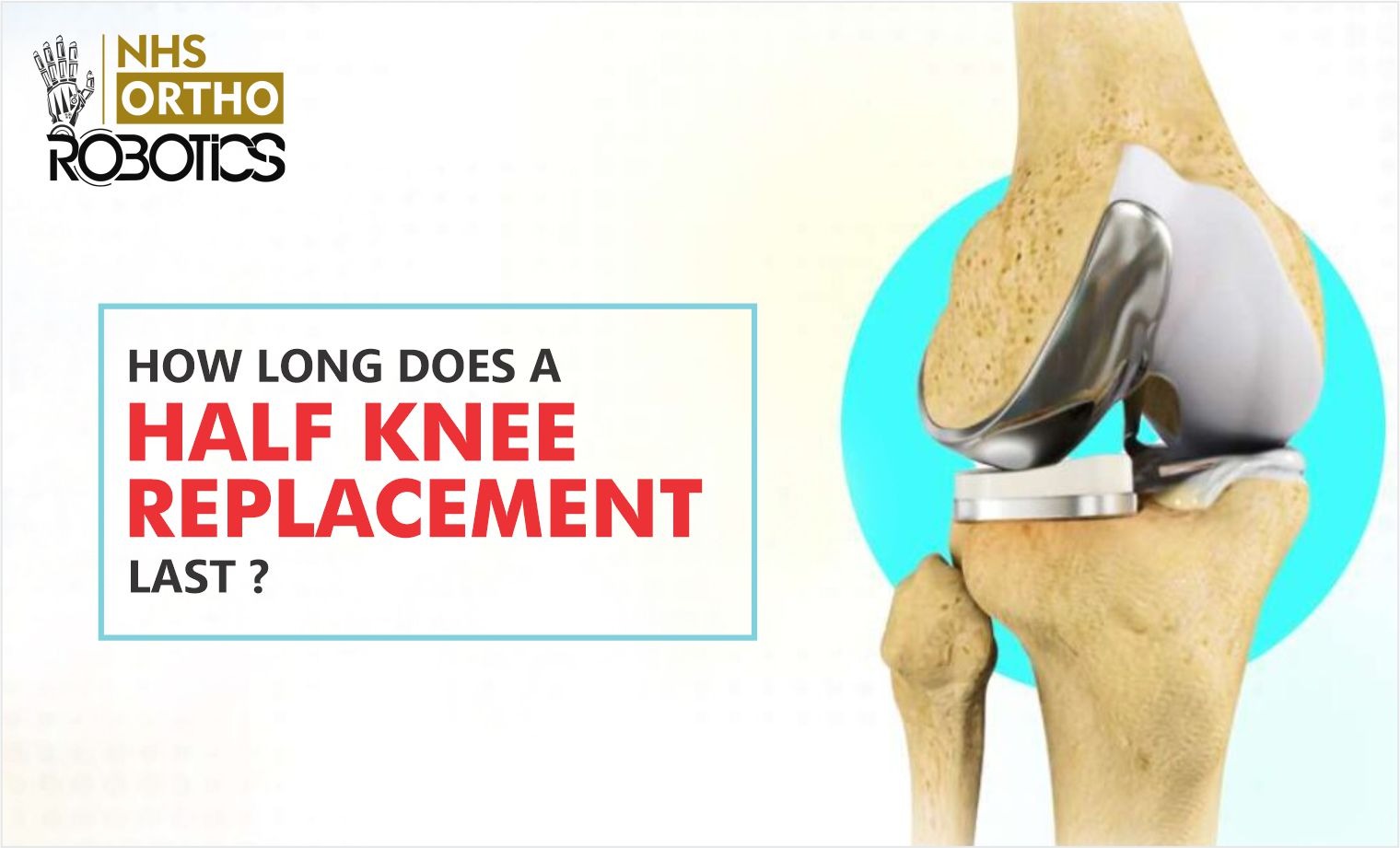
How Long Does a Half Knee Replacement Last? Understanding Longevity and Lifestyle After Surgery
Knee pain caused by arthritis or joint degeneration can greatly impact daily life, limiting mobility and comfort. For many patients, Half Knee Replacement — also known as Unicompartmental Knee Replacement — offers an effective and minimally invasive solution to restore function while preserving natural knee movement. But one question often arises: How long does a half knee replacement actually last?
At NHS Ortho Robotics (a unit of NHS Hospital), under the leadership of Dr Shubhang Aggarwal (MCh Orthopaedics), patients benefit from advanced robotic technology, expert care, and a personalised approach that ensures both durability and long-term satisfaction. With 21+ years of experience and a team of 5 orthopaedic surgeons, the hospital stands among the most trusted centres for joint replacement in the region — and is also one of the first centres to launch Robotic Surgery for orthopaedic excellence.
Understanding Half Knee Replacement
A Half Knee Replacement involves replacing only the damaged compartment of the knee — typically the inner (medial) or outer (lateral) side — while keeping the healthy bone, cartilage, and ligaments intact. This approach is less invasive than a total knee replacement, allowing for faster recovery, reduced pain, and more natural knee function.
It is ideally suited for patients with early-stage osteoarthritis where damage is confined to a single compartment. Robotic technology further enhances precision, ensuring the new implant fits perfectly with the patient’s anatomy.
The Expected Longevity of a Half Knee Replacement
Modern partial knee implants are designed to last 15 to 20 years or more, depending on several factors such as the patient’s age, activity level, body weight, and adherence to post-surgery rehabilitation.
With robotic-assisted surgery, the lifespan of implants has significantly improved. Robotic systems ensure perfect alignment and placement — key factors in reducing wear and tear over time. Studies have shown that patients undergoing robotic half knee replacement experience fewer complications and longer implant survival compared to traditional methods.
At NHS Ortho Robotics, precision technology minimises bone loss and ensures that the implant is positioned with millimetre accuracy, promoting natural knee movement and longer performance.
Factors That Influence Implant Longevity
- Surgical Accuracy: Even a slight misalignment can affect the lifespan of an implant. Robotic-assisted systems used at NHS Ortho Robotics ensure unparalleled precision in positioning, alignment, and balance.
- Quality of Implant Materials: High-grade titanium and advanced polyethylene liners used at NHS Hospital resist wear, providing smooth movement and durability for years.
- Patient’s Lifestyle and Activity Level: Moderate activity like walking, swimming, and cycling helps strengthen muscles and maintain implant function. However, high-impact activities such as running or jumping can accelerate wear.
- Weight Management: Maintaining a healthy weight reduces stress on the implant, improving its lifespan and function.
- Postoperative Rehabilitation: A structured physiotherapy programme is essential for joint flexibility, muscle strength, and balanced gait. The orthopaedic team at NHS Hospital ensures every patient follows a guided recovery plan tailored to individual needs.
Maintenance and Post-Surgery Lifestyle
Longevity doesn’t depend on surgery alone — maintaining your new knee is equally important. Patients are encouraged to adopt a healthy lifestyle that promotes joint care:
- Stay Active: Gentle exercise helps strengthen surrounding muscles and supports the joint.
- Avoid High-Impact Sports: Protect your implant by avoiding activities that cause repetitive stress.
- Follow Medical Advice: Regular follow-ups allow early detection of any wear or alignment issues.
- Balanced Diet: Proper nutrition aids bone health and tissue healing.
- Physiotherapy: Regular sessions help maintain flexibility and joint balance.
The team of 5 orthopaedic surgeons at NHS Ortho Robotics provides continuous postoperative guidance, ensuring that each patient adapts smoothly to their improved mobility and pain-free lifestyle.
The Role of Robotic Surgery in Enhancing Longevity
Robotic technology has revolutionised joint replacement surgery, offering unmatched precision and predictability. At NHS Ortho Robotics, one of the first centres in the region to introduce robotic orthopaedic surgery, advanced systems assist surgeons in mapping the patient’s anatomy and planning each cut with accuracy.
Under the expert supervision of Dr Shubhang Aggarwal (MCh Orthopaedics) — a pioneer in robotic-assisted orthopaedic surgery with 21+ years of experience — the robotic arm helps execute the surgical plan with exactness that manual techniques cannot match. This ensures optimal alignment, better weight distribution, and minimal trauma to surrounding tissues — all contributing to longer implant life and superior outcomes.
Patients benefit from:
- Smaller incisions and reduced scarring
- Minimal blood loss
- Quicker recovery
- Natural joint movement
- Long-lasting results
Why Choose NHS Hospital for Half Knee Replacement?
- Experienced Leadership: Led by Dr Shubhang Aggarwal (MCh Orthopaedics), known for his clinical excellence and patient-focused approach.
- Proven Expertise: Backed by 21+ years of experience and a team of 5 orthopaedic surgeons ensuring complete care.
- Cutting-edge Technology: NHS Ortho Robotics (a unit of NHS Hospital) is among the pioneers in robotic orthopaedic surgery in North India.
- Comprehensive Care: From diagnosis to rehabilitation, every step is handled with precision and compassion.
- High Success Rate: Thousands of satisfied patients with restored mobility and renewed confidence.
Conclusion
A Half Knee Replacement performed with robotic precision offers remarkable longevity, often lasting two decades or more with proper care. With expertise, technology, and patient-centric commitment, NHS Ortho Robotics (a unit of NHS Hospital) has redefined joint replacement outcomes in the region.
Under the guidance of Dr Shubhang Aggarwal (MCh Orthopaedics) and his team of 5 orthopaedic surgeons, patients can look forward to pain-free movement, natural knee function, and a better quality of life — for many years to come.
